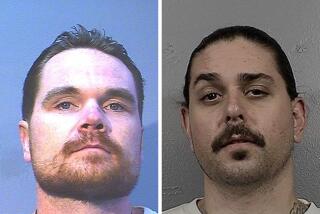DNA Tests Planned in 1983 Chino Hills Massacre Case
- Share via
Attorneys for a death row inmate convicted in the 1983 slayings of a Chino Hills family say the state has agreed to conduct DNA tests on evidence in the notorious case.
Lawyers for Kevin Cooper have tried for several years to get the state to perform DNA analysis that was not available when their client was sentenced to death for hacking and stabbing to death three members of a Chino Hills family and their young neighbor.
The state Supreme Court in 1998 rejected a motion to perform such tests, and a similar request is pending in federal court.
But now, under the shadow of a law passed last year, the state attorney general’s office has agreed to conduct a DNA analysis on numerous items of evidence, Cooper’s attorneys said.
Cooper, 43, has been on death row since 1985 for what came to be known as the Chino Hills massacre.
The crime occurred in June 1983, soon after Cooper escaped from the California Institution for Men at Chino, where he was serving a burglary sentence.
He said he had nothing to do with the killings, which drew so much publicity that the trial was moved from San Bernardino County to San Diego.
The evidence against him was circumstantial, and the sole survivor of the attack, an 8-year-old boy, gave conflicting testimony about the killer’s identity.
The victims, Douglas and Peggy Ryen, 10-year-old daughter Jessica and house guest Christopher Hughes, 11, were found in the Ryens’ Chino Hills home. They had been stabbed and hacked more than 100 times with a knife, ax and ice pick.
The deputy attorney general handling the DNA testing motion declined to comment on any agreement until it is filed with the court.
But two members of Cooper’s appeal team, attorneys David Bernstein of Studio City and William M. McGuigan of Chula Vista, said a deal was reached late last week to proceed with the testing.
Bloodstains from a hatchet and hair recovered from the victims’ hands are among the material to be analyzed.
The attorneys filed a new motion last year after Gov. Gray Davis signed a bill allowing imprisoned felons to request DNA testing under certain conditions.
Although McGuigan said the agreement in the Cooper case would not set a legal precedent, he suggested that it would never have been struck without the new law.
“Our view is it was reached only because of the statute,” he said.
The attorneys said they believe that the Cooper motion is the only one thus far filed under the legislation, which took effect Jan. 1.
DNA testing techniques developed during the last decade are playing an increasing role in criminal cases, both to convict suspects and to free long-imprisoned inmates, including some on death row.
More to Read
Sign up for Essential California
The most important California stories and recommendations in your inbox every morning.
You may occasionally receive promotional content from the Los Angeles Times.














